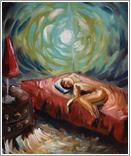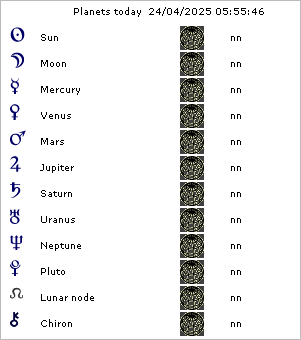|
The opinion of Freud and Jung about dreams
By Lidia Fassio
In Jung’s psychology dreams are seen as being of - revealing and this is in antithesis with Freudian psychology that was sees them as a veil over contents.
For Jung a dream is a real symbolic system that talks to us about the unconscious through its forms.
In psychology dreams are considered as manifestations of a real organisational centre of the personality which, in Jung’s terms is the I. I would go further: in the dream it is the I that tries to show itself to the conscience, makes its own way and tries to be understood.
The word "Dream" in the Galimberti’s dictionary of psychology has the following:
“a mental activity that is carried out while sleeping and of which it is possible to remember, after awakening, images, thoughts and emotions that characterised the oneiric scene. Since they are governed entirely by the laws of affectivity they have an organisation that is completely free from the principles that regulate logical thought and the orientation of reality, above all as far as it regards the principle of identity, of causality, of non-contradiction and the temporal-space co-ordinates that undergo profound alterations compared to daily experiences”.
I would like to underline the fundamental differences between the Freudian vision of a dream and that Jung’s vision, as well as of the importance of dreams in the analysis of ourselves deep down.
To dreams Freud, assigns the task of bringing to light a meaning which previously unconscious.
The Freudian theory also speaks in very exact way of the nature and of the functions of dreams in these terms; he starts from the presupposition that a dream is a psychic product and as such has an exact meaning: it is a particular form of our thoughts and, like him, Freud underlines that a dream is not the unconscious but it is the form in which a thought unwrapped by the preconscious one and by the watchful conscience can reveal itself through the state of sleep.
Freud asserts that in the state of sleep thoughts are reinforced by unconscious desires deformed by oneiric work.
A dream for Freud is masked satisfaction of a repressed or removed desire: and this depends on the fact that it is a material produced by the unconscious which does not know another goal if not to make a desire come true.
A dream is the formation a compromise and it has two functions: on the one hand it is in at one with the I because it serves the desire to sleep; on the other hand it allows a strong desire to have satisfaction.
For Freud the interpretation of dreams is to be considered the “right path that leads to knowledge of the unconscious in psychic life”.
Interpreting dreams through free associations and the symbols, it is possible to highlight some central charts that can bring to the removed one.
As a result, the knowledge of the oneiric symbolism becomes the means favoured for interpretation also in cases in which the associations of the dreamer defective or insufficient.
The Analytical Psychology of Jung defines dreams as a spontaneous self-representation of the current situation of the unconscious expressed in a symbolic form.
Jung’s theory contrasts with that of Freud since it does not exclusively acknowledge a valence of satisfaction of desires in dreams.
For Jung the favoured path to the unconscious is not based on dreams, but complexes that are the cause of the dreams and the symptoms. Jung also believes that they should not be quite a "royal" road, because they have a certain complexity and tortuosity that it does not lead to the heart of the unconscious but that goes further.
For Jung a dream is a creative element that can open up a path, a path, even if it is brisk, to try to understand what the unconscious does with complexes.
Jung states: "I want to understand what dreams have to say about complexes, not what the complexes are. I want to know how the unconscious behaves with the complexes of a person. I want to know what it is preparing itself for, which is therefore why I do not apply the method of free association because I am not interested in knowing the complexes. I am convinced that a dream does not hide anything because a dream is everything. Freud looks for the complexes, I do not: this is the difference: I try to understand what the unconscious does with complexes”.
The ability a dream has of representing the situations in personified shapes allows that part of the unconscious complex which has its own energy to be able to start a dialogue with the conscience. Nevertheless it also goes further because it does not only regard the personal contents of the dreamer but it touches a more primitive level than is also universal and archetypal.
A dream can express archetypes that offer the possibility of giving shape either to the most instinctive part or to the more spiritual part, in other words the two extremes of our psyche that , would otherwise be invisible, as infrared and ultraviolet light is invisible to our eyes.
Jung asserts that through the archetypal images represented by a dream it is possible to see the relationship that exists between opposites: matter and spirit and so the delicate process of recognition can start, approach and integration of the divided parts to conclude that fantastic unification process towards the I the ideal centre of the psyche and destination of each psychic process.
A dream is the natural expression of the vital strength of a person and it supplies images with energies that synthesise past, present and future experiences that are both personal and transpersonal.
A dream can be used in order to access our unconscious parts. They can be used to provide indications for projects, programmes and orientations, and lastly, provide various kinds of inspiration. Jung asserted that a dream is in relation to development, the maintenance or renewal of the processes, structures and organisation of the psyche.
Print this article
|
 |
|



